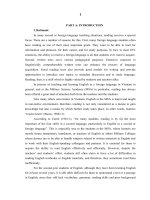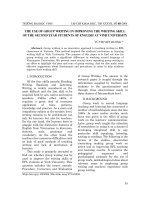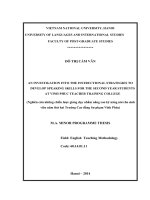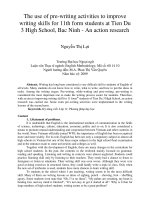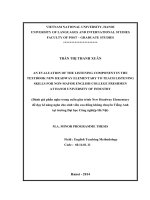Methods to learn listening skills for freshmen at english faculty, HOU
Bạn đang xem bản rút gọn của tài liệu. Xem và tải ngay bản đầy đủ của tài liệu tại đây (1.11 MB, 49 trang )
Graduation paper
HANOI OPEN UNIVERSITY
FACULTY OF ENGLISH
---------------------------CODE: 17
GRADUATION THESIS
B.A DEGREE IN ENGLISH STUDIES
METHODS TO LEARN LISTENING SKILLS FOR
FRESHMEN AT ENGLISH FACULTY, HOU
Supervisor: Ngo Thi Thanh Thao, MA
Student: Le Phuong Anh
Date of birth: 26/11/1993
Courses: K19A2 (2012-2016)
Ha Noi – 2016
0
Lê Phương Anh – K19A3 – (2012 – 2016)
Graduation paper
DECLARATION
Title: Methods to learn Listening skills for freshmen at the English
Faculty, HOU
I certify that no part of the above report has been copied or reproduced
by me from any other person’s work without acknowledgement and that the
report is originally written by me under strict guidance of my supervisor
Hanoi, April 15 2016
Student
Supervisor
Le Phuong Anh
Ngo Thi Thanh Thao
1
Lê Phương Anh – K19A3 – (2012 – 2016)
Graduation paper
CONTENT
1.5. Relations between listening skills and other skills ............................... 16
1.6. Summary............................................................................................. 17
CHAPTER II: THE STUDY ........................................................................ 18
2.1. Research questions .............................................................................. 18
2.2. The subject of the study ...................................................................... 18
2.3. The method of the study ...................................................................... 18
2.4. Freshmen’s current situation of learning listening skills ...................... 19
2.5. Summary............................................................................................. 30
CHAPTER III .............................................................................................. 32
SUGGESTED SOLUTIONS TO IMPROVE LISTENING SKILLS FOR
THE FIRST YEAR STUDENTS AT FACULTY OF ENGISH, HOU ......... 32
3.1. Solving problem about lacking vocabulary ......................................... 32
3.1.1. Active and Passive listening ............................................................. 32
3.1.1.1. Gaining new words by listening podcasts and transcribing............ 34
3.1.1.2. Gaining new words by listening to music ...................................... 35
3.1.1.3. Gaining new words by learning Slang and Colloquial English ...... 36
2
Lê Phương Anh – K19A3 – (2012 – 2016)
Graduation paper
3.2. Solving problem about grammar structure........................................... 37
3.2.1
Solving problem about grammar structure by listening for stresses .. 37
3.3. Solving problem about distraction ....................................................... 38
3.4. Solving problem about different accent of speakers ............................ 38
3.4.1. Improving listening speed by practicing with real Native English
speakers........................................................................................................ 39
3.5. Solving problem about listening speed ................................................ 39
3.5.1. Improving listening speed by watching movie or TV series ............. 40
3.6. Solving problem about pronunciation.................................................. 41
3.6.1. Improving pronunciation by listening to their own speaking ............ 41
3.7. Solving problem about lacking social background knowledge ............ 41
3.8. Summary............................................................................................. 42
PART C: CONCLUSION ............................................................................ 43
REFERENCE ............................................................................................... 44
APPENDIX .................................................................................................. 46
QUESTIONNAIRE .................................................................................... 46
3
Lê Phương Anh – K19A3 – (2012 – 2016)
Graduation paper
ACKNOWLEDGEMENT
I have received great assistances from many people in the preparation of
this paper. Without their assistance and support, this paper might not have
been finished.
First of all, I would like hereby to extend my profound gratitude to my
supervisor, Mrs. Ngo Thi Thanh Thao from who I have received enormous
kindness and guidance.
Also, I am deeply indebted to all the teachers at the English Faculty,
Hanoi Open University for their interesting and useful lectures which have
built in me a firm foundation with immense ideas for the fulfillment of this
paper.
In particular, my special thanks to my dear friends for their support,
advice and providing me with comments and materials.
Last, but not least, I owe my deepest gratitude and thanks family for all
my family for their love, great encouragement and support to me to fulfill this
paper.
Hanoi, April 2016
Le Phuong Anh
4
Lê Phương Anh – K19A3 – (2012 – 2016)
Graduation paper
PART A: INTRODUCTION
1. Rationale
English is considered as the global language. With more than 350 million
people around the world speaking English as a first language and more than
430 million speaking it as a second language, there are English speakers in
most countries around the world. Because English is so widely spoken, it has
often referred to as a “world language”. Besides books, magazine, and
newspapers as well as many websites, etc are designed in English language.
Mastering English at this time will bring to people a lot of advantages (in
study, job promotion, etc…).
These facts have showed the importance and reason why more and more
people learn this language as a second language. There are four skills need to
be mastered. These skills are closely related to each other. However, just one
or two of the four skills tend to be focused on (often writing and reading), and
sometimes the others are not received much attention including Listening
skills. Ralph Nichols says: “The most basic of all human needs is the need to
understand and be understood. The best way to understand people is to listen
to them”, Students need to understand spoken English used in lectures, talk
and presentation, etc..., which they have to encounter regularly. It is also
necessary in the language classroom because the lesson’s input is provided to
the learner through listening. Listening also takes up as much as fifty percent
of our every communication time and is the most used language skill at work
and at home (Goh, 2002).
Moreover, listening is a key to career success. In any job recruitments or
interviews, English always comes first as the foremost criterion of selecting
candidates, and in most job performance reviews or appraisals, English
5
Lê Phương Anh – K19A3 – (2012 – 2016)
Graduation paper
competence is considered one of the most important factors for promotion.
Although knowing the importance of Listening comprehension in study as
well as using it for their later promotion, many students still do not pay much
attention to Listening skill, and it is no doubt that still many of them have bad
results and learn it without effectiveness. For this reason, through what has
been learnt so far, and the experience gained while studying in HOU, I would
like to present my experience of learning English listening skills for freshmen
and help them improve listening comprehension skills. Therefore, I decided to
choose the topic: “Methods to learn Listening skills for freshmen at the
English Faculty, HOU” as the subject for my graduation paper.
2. Aims and purposes of the study
This study aims at finding problems and understanding the current
situation of teaching and learning skills of first year students at HOU as well
as recommending some suggestions to improve their listening.
3. Scope of the study
Due to the limited time and knowledge, the study only focuses on issues
involved in first year students at Faculty of English, HOU and publicizes
some useful methods to improve listening skills.
4. Research questions
What are the methods to listen English well?
5. Methods of the study
A survey is carried out to discover the current situation of teaching and
learning listening skills of first year students at Faculty of English so as to
introduce some helpful solutions to them overcome this subject. Besides, the
6
Lê Phương Anh – K19A3 – (2012 – 2016)
Graduation paper
author refers to many materials related to listening as well as many famous
writers’ views on this subject in order to make this study more persuasive and
more reasonable.
6. Design of the report
Part A: Introduction includes its reasons for choosing, aims, scope,
methods and design of the study.
Part B: Development is the most important part of the paper. It contains
three chapters
Chapter I: Theoretical Background introduces theories related to
listening
Chapter II: Findings is the main part of the study, which discloses the
current situation of teaching and learning listening skills for the first year
students at FOE and identifies their problems in listening.
Chapter III: Some methods developing listening skills for the first year
students at Faculty of English, HOU: give out some suggestions and solutions
to deal with difficulties of students in listening English.
Part C: Conclusion is the concluding part where the writer gives the
conclusions and sum up all the main ideas of the graduation paper.
7
Lê Phương Anh – K19A3 – (2012 – 2016)
Graduation paper
PART B: DEVELOPMENT
CHAPTER I: THEORITICAL BACKGROUND
The first language mode that babies acquire is listening. Listening is the
foundation for all aspects of language and cognitive development and plays
an incredibly important role in the process of learning and communication in
life. It’s not easy to grasp listening skills in studying English. Also, to get
excellent listening skills is too difficult. This chapter will bring general
knowledge and common concept of listening for learners.
1.1.
Definitions of listening
Many academics have researched listening skills and presented a lot of
definitions of listening. Although how many definitions of listening there
are, all of them still points out the same view about listening.
Listening is the act of hearing intently. It is also a process similar to
reading which should possess knowledge of phonology, syntax, semantics
and text understanding. According to Wikipedia, “listening is the
conscious processing of the auditory stimuli that have been perceived
through hearing.”
International Listening Association defines listening as, Listening, the
process of receiving, constructing meaning from, and responding to
spoken and/ or nonverbal messages.
Thomlison (1984), “Active listening, which is very important for effective
communication”. Listening can be also defined as, “More than just
hearing and to understand and interpret the meaning of a conversation”.
8
Lê Phương Anh – K19A3 – (2012 – 2016)
Graduation paper
Howatt and Dakin (1974), “listening is the ability to identify and
understand what others are saying; this process involves understanding a
speaker’s accent or pronunciation, the speaker’s grammar and vocabulary,
and comprehension of meaning. An able listener is capable of doing these
four things simultaneously”.
Furthermore, Gordon (1985) argues that “empathy is essential to
listening and contends that it is more than a polite attempt to identify a
speaker’s perspectives. Rather more importantly, empathetic understanding
expands to egocentric pro-social behavior”. Thus, the listener altruistically
acknowledges concern for the speaker’s welfare and interests.
Ronal and Roskelly (1985) define listening as “an active process
requiring the same skills of prediction, hypothesizing, checking, revising, and
generalizing that writing and reading demand”, and these authors present
specific exercises to make students active listeners who are aware of the
“inner voice” one hears when writing.
Listening is usually defined as a receptive skill including both physical
process and analytical, explanative process. However, this definition is often
expanded to comprise crucial listening skills (such as analysis and synthesis)
and nonverbal listening (understanding the meaning of tone of voice, facial
expressions, gestures, and other nonverbal cues). The expanded definition of
listening also emphasizes the relationship between listening and speaking
1.2.
Listening strategies
Listening strategies are techniques or activities that contribute directly to the
comprehension and recall of listening input. Listening strategies can be
classified by how the listener processes the input.
9
Lê Phương Anh – K19A3 – (2012 – 2016)
Graduation paper
a. Top-down strategies are listener based; the listener taps into
background knowledge of the topic, the situation or context, the type of
text, and the language. This background knowledge activates a set of
expectations that help the listener to interpret what is heard and
anticipate what will come next. Top-down strategies include
• listening for the main idea
• predicting
• drawing inferences
• summarizing
b. Bottom-up strategies are text based; the listener relies on the language
in the message, that is, the combination of sounds, words, and grammar
that creates meaning. Bottom-up strategies include
• listening for specific details
• recognizing cognates
• recognizing word-order patterns
Strategic listeners also use metacognitive strategies to plan, monitor, and
evaluate their listening.
• They plan by deciding which listening strategies will serve best in a
particular situation.
• They monitor their comprehension and the effectiveness of the selected
strategies.
They evaluate by determining whether they have achieved their listening
comprehension goals and whether the combination of listening strategies
10
Lê Phương Anh – K19A3 – (2012 – 2016)
Graduation paper
selected was an effective one.
1.3.
Definition of listening skills
Listening covers a variety of different skills such as predicting, getting the
gist, extracting specific information, extracting detailed information and
making inferences, etc… For non-native speakers, it’s a challenge to acquire
listening skills in relation to the language they are learning, and to have good
listening skills, it’s really difficult. But if they have strategies, their listening
skills will be improved.
a. Basic process
There are several basic processes at work in listening. These do not
necessarily occur sequentially; they may occur simultaneously, in rapid
succession, or backward and forward as needed. The listener is not usually
conscious of performing these steps, nor of switching back and forth
between them.
- Determines a reason for listening;
- Takes the raw speech and deposits an image of it in short-term
memory;
- Attempts to organize the information by identifying the type of speech
event (conversation, lecture, radio ad) and the function of the message
(persuade, inform, request);
- Predicts information expected to be included in the message;
- Recalls background information (schemata) to help interpret the
message;
- Assigns a meaning to the message;
11
Lê Phương Anh – K19A3 – (2012 – 2016)
Graduation paper
- Checks that the message has been understood;
- Determines the information to be held in long-term memory;
- Deletes the original form of the message that had been received into
short-term memory (Brown 1994; Dunkel, 1986).
1.4.
Classification of Listening skills
a. Predicting content
Depending on the context – a news report, a university lecture, an
exchange in a supermarket – you can often predict the kind of words and
style of language the speaker will use. Our knowledge of the world helps
us anticipate the kind of information we are likely to hear. Moreover,
when we predict the topic of a talk or a conversation, all the related
vocabulary stored in our brains is 'activated' to help us better understand
what we're listening to.
Tip: If you are taking a listening test, skim through the questions first and
try to predict what kind of information you need to listen out for. A
question beginning 'How many..?', for example, will probably require you
to listen for a specific number or quantity of something.
b. Inferring meaning
It’s essential that we hardly know every word in a foreign language and it
would be hassled to look up in a dictionary when you don’t recognize
words. Then, learning how to guess words you don’t know is an important
skill. Guessing is done by noticing the context or looking at the grammar
of the sentences.
12
Lê Phương Anh – K19A3 – (2012 – 2016)
Graduation paper
In fact, when you let your brain process meaning of words you don’t know
basing on the information around it, or in other word, the context; you will
remember that word deeply and learn the skill to guess words. Context can
provide cues to the meaning of unknown words and phrase. Guessing from
the context helps the listeners (or readers) understand in situations when it
would be either impossible or extremely time consuming to refer to a
dictionary.
c. Listening for stress
English is considered a stressed language while many other languages are
considered syllabic. What does this mean? It means that, in English, we give
stress to certain words while other words are quickly spoken. In other
languages, such as French or Italian, each syllable receives equal importance
(there is stress, but each syllable has its own length).
Many speakers of syllabic languages don’t understand why they quickly
speak or swallow a number of words in a sentence. In syllabic languages each
syllable has equal importance, and therefore equal time is needed. English
however, spends more time on specific stressed words while quickly gliding
over the other, less important, words.
In some languages, for example Japanese, people say each syllable with equal
force. But in English, and some other languages, we put a big force (stress)
on some syllable and no force on other syllables or words. This can make it
difficult for the speakers of other languages to understand English that is
spoken quickly. Of course, for native speakers it is not difficult – in fact,
stress actually helps native speakers understand each other. So it is very
important.
13
Lê Phương Anh – K19A3 – (2012 – 2016)
Graduation paper
d. Listening for gist and detail
The way we listen to something depends on reasons. If we listen to the
news, we’re probably not listening very carefully, may simply just want to
get a general idea. If we ask for instructions like how to get to a
destination or to use electric items, we have to listen more attentively.
Thus we listen for gist and detail.
• When listening for details, you are interested in a specific kind of
information – perhaps a number, name or object. You can ignore
anything that does not sound relevant. In this way, you are able to
narrow down your search and get the detail you need.
Tip: If you are taking a test, as soon as you get the question paper, skim
through the questions, underline the important words and decide what
kind of detail you need to identify in the listening text.
• Listening for gist: it to get the ‘whole picture’ without having to
understand every phrases or sentences. What we need to do is to
pick up key words and other clues so as to make a guess at the
meaning.
e. Listening and note-taking
Information presented in the class often contains the central concept of the
course and the material most likely to be included on exam. Yet, students
frequency don not realize the importance of note-taking and listening.
Note taking is an important study skill helps students do better. Learners
need it to call up important information, to review information, and to
store that information so they can use it later.
14
Lê Phương Anh – K19A3 – (2012 – 2016)
Graduation paper
Taking notes is an important part of the life of every student. There are
two main reasons why note-taking is important:
1. When you are reading or listening, taking notes helps you
concentrate. In order to take notes-to write something sensible-you must
understand the text. As listening and reading are interactive tasks, taking
notes help you make sense of the text. Taking notes does not mean writing
down every word you hear; you need to actively, decide what is important and
how is related to what you have already written.
2. Notes help you to maintain a permanent record of what you have read
or listen to. This is useful when revising in the future for examinations or
other reason.
Good notes should be accurate, clear and concise. They should show the
organization of the text, and this should show the relationship between the ideas.
f. Detecting signposts
There are signposts in language that help us follow what we're listening to.
These words, which link ideas, help us to understand what the speaker is
talking about and where they are taking us. They're particularly important
in presentations and lectures. For example: first of all, moving on to, in
conclusion, in other words, to illustrate this…
Tip: Group signpost phrases according to their functions, and continue to
add new expressions as you come across them.
g. Critical listening
15
Lê Phương Anh – K19A3 – (2012 – 2016)
Graduation paper
Critical listening is listening in order to evaluate and judge, forming
opinion about what is being said. Judgment includes assessing strengths
and weaknesses, agreement and approval.
This form of listening requires significant real-time cognitive effort as the
listener analyzes what is being said, relating it to existing knowledge and
rules, whilst simultaneously listening to the ongoing words from the
speaker.
h. Summarizing
Summarizing skill is needed when we repeat the main ideas of the text.
When practice this skill, listener will try to repeat or reduce the main
points into fewer words. We might use this skill when reporting the main
point of the news to a friend. Summarizing the idea enthuses the speakers
that you’re interested in what they are saying and also see if the message
they’ve sent is received properly by you.
Summary also shows that you really understand what you’re listened and
help you choose the important parts of something. It challenges you to
organize what you listen to, reformulate it and put it your own words.
1.5.
Relations between listening skills and other skills
Research has found that improvement in listening skill has a positive effect
on other language skills - reading, writing and speaking. To illustrate,
Morris and Leavey (2006) conducted a study focusing on preschoolers‟
phonological development. The study reveals that listening instruction
skills improve preschooler’s phonological awareness. Similarly, two other
16
Lê Phương Anh – K19A3 – (2012 – 2016)
Graduation paper
studies found out that the listening skills instruction assists middle school
students to improve their reading comprehension (Badian, 1999; Bergman,
1999). In addition, the outcome of Bergman‟s (1999) study revealed that
listening and reading stories at the same time lead participants to improve
their reading comprehension performance.
It’s often said that if you listen well then you speak well, excellent reading
comprehension leads to good writing pieces. So we can see that basic
bricks and mortar of a language acquisition and the relationship between
listening and other language skills is closely intertwined.
1.6.
Summary
Chapter 1 focuses on the definition of listening, listening skills and
classification of listening skills, give readers an overview about this
language skill as well as the importance of it. Otherwise, in this chapter,
the author also provides readers the relation between listening with other
language skills.
17
Lê Phương Anh – K19A3 – (2012 – 2016)
Graduation paper
CHAPTER II: THE STUDY
2.1.
Research questions
As mentioned in Part A, the study aims at recommending some
suggestions for the freshmen at Hanoi Open University, Faculty of English
and modern languages to improve their listening skills. Especially it aims at
answering the following questions:
1. What difficulties do the first year students face in listening skills?
2. What are some suggestions for students to improve their listening
skills?
2.2.
The subject of the study
This survey is done with freshmen who have begun to study at faculty of
English, HOU. They have started to approach listening lessons and lack of
experience.
2.3.
The method of the study
In order to get information about the problems of the freshmen in
listening skills, a questionnaire was worked out in English. 100 questionnaires
were given to 1st year students and they were asked to answer them honestly
to guarantee the accuracy and the reliability of the result.
The questionnaire (Appendix) consists of 10 questions attributed to help
finding essential information of the overview of studying listening as well as
challenges facing students. Question 1 aims to explore the difficulties that
students often encounter in listening English. Question 2 is to find out what
types of listening exercises students are interested in. Question 3 looks for the
listening techniques that students often use to listen in class. Question 4 finds
out what way students prefer to do with the listening tasks in class. Question 5
18
Lê Phương Anh – K19A3 – (2012 – 2016)
Graduation paper
is to find out the teacher’s role in teaching English listening skill in class.
Question 6 finds out what kind of materials students usually use practice
listening skills. Question 7 and 8 aims to find how often students practice
their listening skills at home. Question 9 aims to find out students’ attitudes
toward listening skills.
2.4.
Freshmen’s current situation of learning listening skills
As soon as being done by students and recollected, the questionnaires
were analyzed carefully as bellow.
Q1: Which factors affect you the most in
listening skill
New words
23%
Grammar structures
70%
45%
Distraction
Different accent of speakers
37%
27%
7%
Listening speed
11%
Pronunciation
CHART 1: STUDENTS’ LISTENING PROBLEMS
Problem 1: New words
The biggest problem that almost every 1st year students have to face is
the lack vocabulary. The above research shows that 70% the students lack of
19
Lê Phương Anh – K19A3 – (2012 – 2016)
Graduation paper
vocabulary to deal with listening exercises. New words are usually thought to
be obstacles in listening process and make students confused and nervous,
because students can’t guess the meaning of words then the meaning of
sentences. Besides, students usually learn academic words (in school and
university) and don’t have habit to widen the vocabulary about other aspects
of society and culture. That’s the reason why they don’t understand normal
life’s conversation (too much slangs) and specialized terms. It’s an urge for
the students to increase vocabulary and build their lexicon in order to help
them listen actively and make them understand the speakers easily.
Problem 2: Grammar structures
Grammar structures are the problem shared 7% of the first year students.
Even students are taught grammar structures very well, they still don’t catch
all things they listen. Because syntax of spoken English is different, it’s
ungrammatically formed, simplified and can be understood by implication
and presupposition negotiated between listeners and speakers.
Nevertheless, many students become confused about relationship in a
sentence and connections between sentences and they are often unsure of
relationship within sentences. Thus, lack of grammatical knowledge can
reduce English listening skills.
Problem 3: Distraction
As it is presented on the chart, there are 11% of first year students find
hard to concentrate while practicing listening skill. In fact, they don’t know
the way to get important keys, and that leads to distraction. They tend to pay
attention to listen to everything, and are often easily distracted when hearing a
strange word. They sometimes feel that if they don’t listen to every word,
they will miss important ones. As the result, they do not know that it is
20
Lê Phương Anh – K19A3 – (2012 – 2016)
Graduation paper
redundant and unnecessary for them to do so. It is obvious that students who
try to understand every single word cannot catch on the information
completely and often get bad mark.
Problem 4: Different accent of speakers
27% of the students reported that their listening comprehension was
affected by the speakers’ accent. The word “accent” here refers to the variety
of spoken English, that is, whether it was British, American or others. The
students also used the word include features of speech that they noticed as
being different from the type of “standard” English they were familiar with.
In fact, the first accent affected students most is the one of their teachers.
They have got used to listening to their teachers’ accents since they were at
high school. Consequently, they are all very surprised and confused when
listening to other accents. Students often listen to some popular accents such
as American British and Australia English so they seem to have difficulties in
listening to Singaporean, Malaysian and Indian…
In brief, first year students should get used to as many different accents
as possible to improve listening skills better.
Problem 5: Listening speed
According to the survey, 37% the first year students cannot control over
speed. It is a big obstacle for them during the listening process. They claim
that the native speakers speed is so fast that they cannot catch up. All of the
students tend to catch all the words from the speakers. They were affected by
teaching method at secondary school which targets at accuracy rather than
fluency. Teacher try to speak slowly and clearly so that students can
comprehend everything in lesson. As a sequence, their students have formed a
habit of trying to identify words clearly and slowly. Doing in this way, they
21
Lê Phương Anh – K19A3 – (2012 – 2016)
Graduation paper
can know what the teacher say to them. But in real life, if they strive to
identify every word in utterance, they will miss the next part and easily fail to
catch the meaning from the message.
Problem 6: Pronunciation
Being reported above, 45% of the first year students have problems in
pronunciation. Many learners of English have got trouble in distinguishing
between various sounds of the English language and it prevents them from
listening clearly.
The English language can be very difficult to pronounce and listen to
British English speakers from different regions of the country can be quite
confusing. There are hundreds of variations on these regional accents and
many towns have their own particular differences. Pronunciation of British
English changes a lot. It is not static language. This is because some words
which are said correctly by careful speakers may be pronounced incorrectly
by many people. The incorrect version becomes the norm and subsequently
becomes correct and accepted.
This is reason why English pronunciation is so difficult. It can be very
hard for any learner of English to develop good listening skills when there are
many variations in accent and mispronunciations are so common among
native British English speakers.
Problem 7: Lack of social background knowledge
According to the survey data, 23% of the first year students do not pay
much attention to equipping themselves with the background knowledge.
Cruse (2004) suggests: “Language is a kind of cultural expression. It is
necessary for students to know habits, even life styles”. According to Oxford,
R. (1990), “Applying Indirect Strategies to the four language skills “General
22
Lê Phương Anh – K19A3 – (2012 – 2016)
Graduation paper
background knowledge (including knowledge of the target culture, knowledge
of the topic under discussion, and general world knowledge of current affairs,
art, politics, and literature) helps language learners to make guesses about
what they hear or read. A recent study indicates that associating newly heard
information with prior knowledge is a powerful and very frequently used way
to guess the meaning of a listening passage. Just as Oxford has suggested,
background knowledge is important to listening. Students lack of knowledge
about the culture of countries around the world, politics, economics, customs,
geography and so on that prevents them from effective listening. In addition,
sometimes although the students have some knowledge of the topic, they do
not often make use of the background knowledge to help their listening
consciously. Therefore, students should equip for themselves the basic
knowledge about the culture of English speaking to understand and use of
English accurately.
23
Lê Phương Anh – K19A3 – (2012 – 2016)
Graduation paper
CHART 2: STUDENTS’ FAVOURITE LISTENING EXERCISES
This question is to find out students’ favorite listening exercises which
improves their listening skills much. It is obvious that most of students prefer
Finding and correcting mistakes (60%) and True/False statement excises.
(54%) Gap filling tasks seem to be less interesting to them (only 45%). The
rest of the exercises such as: Summarizing (16%), answering comprehension
(33%), dictation and repetition (12%) and prediction (37%).
It is necessary for students to practice different types of listening
exercises in order to broaden their minds and increase their creativities. By
doing this, students can improve their listening skills a lot.
Q3: Which listening techniques do you often
use while listening in class?
0
21%
Skimming
59%
38%
Scanning
Summarizing
Infering
12%
34%
Predicting
Sound discrimination
CHART 3: LISTENNG TECHNIQUES USED BY STUDENTS
As being presented in the chart, 59% of the students used predicting technique
the most. Predicting in listening is a very important listening skill and
listening habit, students are often reluctant to use prediction. It is
24
Lê Phương Anh – K19A3 – (2012 – 2016)
